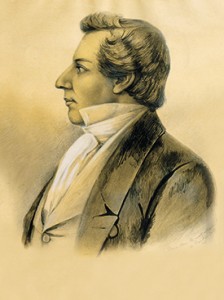One of the most unique characters revealed to us in the latter days through new revealed scripture is Enoch the Prophet. His vision of the heavens and earth is rivaled only by John’s, Nephi’s, Ezekiel’s, and the like. His power in teaching is described in unequaled terms, his overwhelming charisma brings about the most successful Zion community known to us in the history of the world, and he is witness to events not given to any other prophet that we know of (he sees God actually weep). Yet, he largely flies under the radar, undetected and under-appreciated. This is especially true in terms of what ancient literature has to say about him and how that image matches up with the one Joseph Smith gave us.
When Joseph Smith was commanded to “translate” the Bible the direction was given under the premise that he would be restoring many of the “plain and precious truths” that had been lost and/or removed. The JST was, to my understanding, considered by most people to primarily be this: a restoration of ancient text lost during the long ages of apostasy. (see TPJS 9-10)
Today, the trend among scholars in the Church studying the text of the JST (now that the text can be verified) has been to argue that the JST filled several purposes, not just a restoration of anciently lost text. Things have even gone so far that I heard Thom Wayment say two years ago when he spoke at BYU in a presentation of his detailed study of the changes made in the JST that very little evidence points to any restorations of text. I am not disparaging this view, many of the changes do appear to have discernible purposes other than restoring the text and the evidence makes it difficult to identify places where perhaps the text is being truly restored. I have not read Wayment’s JST book but I presume that it is more of the same.
It strikes me (and this is a truly half-formed, uneducated opinion) that if we can see many alternative reasons for the small changes made in Joseph’s translation of the Bible that reduce the likelihood of their being restorations of ancient lost text then the longer passages seemingly created whole-cloth from the revelations given to him are greater candidates for restored text status. This is so highly debatable, and I’m so out of my league, that you may all feel free to mock me and point out my obvious flaws (I know I can count on some of you to oblige this request). 🙂
I’m thinking along the lines of the story of Adam’s baptism, the prophecy of Joseph in Gen. 50, etc. And for me, the entire account of Enoch in Moses 6-7. I’m not interested in arguing about the previous two examples (or really any other place), it’s just an observation.
One of the biggest reasons that most passages are excluded from consideration as restored ancient text is that as we find older and older copies of the Biblical books we continue to lack evidence for textual changes that correspond to Joseph’s. It could be argued easily that we haven’t found any texts old enough yet (especially with the OT) but it would be nice if we found at least one home-run example of Joseph nailing a text restoration in the JST. Though it’s possible that some have been identified, I’m not aware of any.
So how does Enoch fit into all this? Simple: The bible only refers to Enoch in a very small handful of verses: Gen. 5:18-24 and we don’t learn much about him. His dad was Jared, he gave birth to Methuselah, he didn’t live as long as his fathers or son, and (most tantalizingly) he walked with God and then simply was not. That last part is enough to drive any good Jew crazy and many stories are told to fill out the details.
A huge amount of extra-biblical literature exists about or refers to Enoch. We’ll discuss that later but it needs be noted that it had a noticeable affect on the earliest Christians: Hebrews 11:5 tells us that Enoch was translated and didn’t taste of death because of his superior testimony; James 1:14-15 quotes 1 Enoch and the greater part of his book is directly influenced by that text. It is universally agreed by scholars that the earliest Christians accepted some form of Enochic literature as scriptural though the extent of its influence on the NT and Christian doctrine is debated.
But the point is that our early Christian brothers and sisters had a much more extensive Enoch tradition than is currently extant in the Bible today that they accepted to one degree or another as being true. In fact, it’s not until Origen that we hear of any Christian rejecting it as being a true part of their scriptures and only then because he could not or did not want to defend it against critics.
So here we have an Enochic tradition that at least was reasonably acceptable to early Christians. Add to this that Joseph Smith was given a large, detailed revelation about this same Enoch and now we have an avenue of research that needs to be taken up. How do the two traditions compare? What did the 1st century Christian Enoch look like and is it anything like Joseph’s Enoch? Could Joseph’s Enoch account really be a restoration of lost text? And who has even attempted to answer these questions among the Saints? (I’ll give you a hint: his name starts with an “n” and ends with an “ibley”) Next we set the stage a little more fully.











